Whether we like it or not, it’s common for Dachshunds to always act like they are starving.
This behavior can often lead to overfeeding and obese pets. However, it can also signal a health issue.
This article is meant to help you determine the cause of your Dachshund’s hungry behavior.
In this article, we will explore when a Dachshund acting like they are hungry is normal, when they should see a vet, and how to deal with a dog that is annoying because they are always looking for food.
We’ve pinpointed the main reasons why your Dachshund may be acting like they’re starving, so let’s get to it!
Why Does My Dachshund Act Like He’s Always Hungry?
It’s common for dogs to beg for food from their humans. We all know this.
For onlookers, the behavior can be cute and funny, but for owners, it can be frustrating.
It gets to be especially bothersome when your Dachshund has just eaten a full meal, and they still act like they are starving.
This has probably triggered a, “You JUST ate…” response from you on more than one occasion.
Furthermore, a hungry, begging Dachshund can be dangerous.
Slinky dogs at your feet, pawing, scratching and barking at you for food. If this type of behavior gets out of hand, someone could get hurt.
Finding out why your Dachshund is always acting hungry is the first step.
So, why are they doing it? Why is your Dachshund acting like they are always hungry, or still starving despite consistent, routine meals?
These are some of the reasons why your Dachshund may be acting like they are always hungry. We’ll discuss each point more specifically below:
- Seeking attention
- Bored with their current food
- Not being fed enough
- Meal time is boring
- Medical concerns
- Age
Let’s break down each topic.
Seeing attention
When your Dachshund acts like they haven’t eaten in eighteen years, it could be because it’s become a learned attention-seeking behavior.
If begging has provided a scrumptious reward in the past, your Dachshund will quickly learn to come back and beg for more.
Begging can be a challenging behavior to correct if not nipped in the bud quickly.
Even if you don’t allow your Dachshund to have human food, acting hungry and begging for food may be your dog’s way to trigger any sort of response from you.
In this case, you pup is likely to keep coming back for more attention.
Bored with their current food
Your Doxie could be acting starved because they are bored with their current food and looking for variety.
Food routines are a great thing for dogs, but the same food every single day for 12 years sounds depressing.
Try simply changing the protein of your Dachshund’s food to offer exciting new flavor.
Remember that Dachshunds are born hunters.
It’s in any dog’s instincts to want to hunt for food, and Dachshunds sometimes have a higher drive than other breeds.
Dachshunds were born to hunt game, so always sniffing around for food is in their genes.
Since Dachshunds were bred to hunt game, it’s a possibility that eating food from a bowl everyday isn’t suiting their needs.
Your Dachshund then may act hungry in an attempt to satisfy their instinctual cravings to hunt and eat.
Not being fed enough
It’s unlikely but it could be possible your Doxie isn’t getting enough food to eat.
If you suspect this might be the case, be sure to check the feeding instructions on your dog’s food labels.
Medical concerns
A Dachshund who’s always hungry could potentially be ill.
Many illnesses and diseases cause dogs to have appetite issues, with diabetes being a prime example.
Other health problems that can cause a dog’s apatite, or the feeling of being hungry, to increase include Inflammatory Bowel Disease (IBD), intestinal cancer, or hypothyroidism.
Your Dachshund’s vet can perform tests to further eliminate medical issues.
Age
Senior dogs commonly experience increased appetite, but it can be from those topics that pet parents absolutely dread discussing – like canine dementia or inability to keep weight on due to metabolic medical issues.
It’s time to see your veterinarian if your Dachshund a senior over 8 years old – you think this could be the case.
How Much Should a Dachshund Eat?
In order to know if you’re feeding your Dachshund the correct amount of food, start by determining exactly how much you need to give them.
Consult this article to see how much a Dachshund should eat.
Then you will need to consider how you’re feeding your Doxie. One time a day? Do you just leave a full bowl out for them to chow down? Do they eat on a schedule?
Feeding your Dachshund on a schedule offers several benefits, and it’s worth considering if you have a “starving” Doxie who is currently being free fed.
How to Deal With a Dog That’s Always Hungry
First thing’s first; if your Dachshund experiences a sudden change in appetite, call your veterinarian immediately.
Lack of desire to eat or drink, or excessive appetite and thirst can both be the first signs of a bigger issue at hand.
Whether your Dachshund is a puppy or a senior, your veterinarian will also be able to help create a good diet plan for their needs, or provide resources for your dog to see a specialist.
If you can rule out health issues, there are various other options to look into.
Thankfully there are a TON of great options you can try if health concerns have been ruled out.
Let’s start with the behavioral portion of a dog merely “acting” like they are starving.
Dachshunds occasionally learn to act like they’re starving because it gets them attention from their owners. Whether it’s positive or negative attention, dogs like it!
As stated earlier, Dachshunds may claw at you, scratch, or even bark in an attempt to get more food. When this happens, it’s best ignore it!
Yes, ignoring our dogs is one of the most difficult things to do. But in order to not reward your Dachshund for attention-seeking by acting like they’re famished, you have to stop enabling your Dachshund.
Stop giving in, and starting walking away instead.
Additionally, you can interrupt the annoying begging by going for a walk or taking a five minute session to work on training.
You can work on breaking the cycle by helping your Dachshund’s to exert mental and physical energy.
Slow feeder bowls and puzzles are terrific tools for enriching your Dachshund’s mealtime.
A slow feeder gives the feeling that your dog is foraging for their food, as opposed to it being just piled in front of them.
These bowls and puzzles assist in slowing eating as well, making for a healthier, longer meal session.
More enjoyable, long-lasting meals can help a dog feel fuller, reducing hunger in general.
Another option for filling your Dachshund’s tummy is to add some dog-friendly fruits or vegetables, such as unsalted green beans or carrots.
You can also mix your dog’s food with a bit of delicious no-sodium bone broth to add volume and taste to your Dachshund’s meal.
Automatic pet food feeders can be another tool.
Although most automatic feeders can only be used for dry food, they can be a helpful option if you need help with a new scheduled meal routine.
Final Thoughts
Medical problems aside, there are plenty of tremendous ways you can discourage your Dachshund from always acting hungry.
Tools such as slow feeders, a switch-up in routine, or an additional meal ingredient could be all your pup needs to stop begging all the time.
Once you’ve exhausted all options and have spoken with your veterinarian, it’s a good idea to seek help from a canine behaviorist if your Dachshund is still acting hungry.
Remember that it can take a fair amount of time and effort to change a dog’s learned behavior.
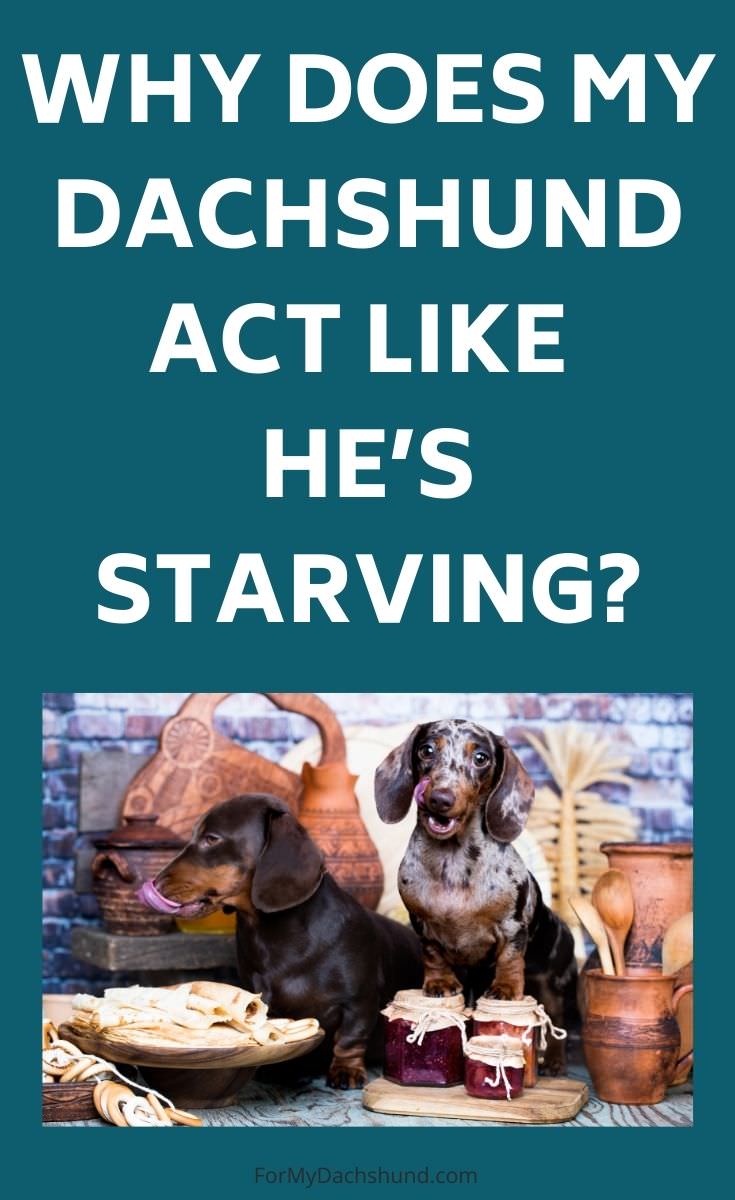
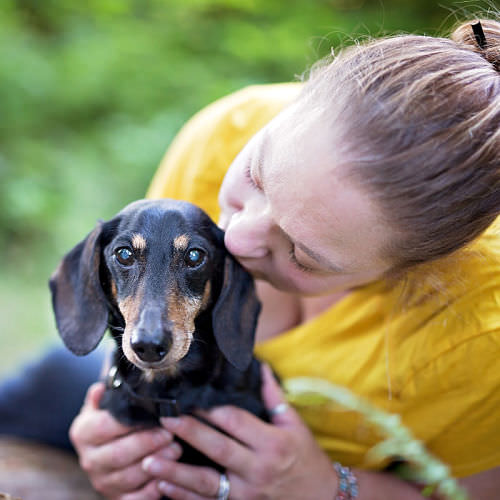
About the Author: Through her 17 years of owning and caring for Dachshunds, and almost 10 years researching and writing about them, JW has become a respected expert in the Dachshund community. Read more about her here.






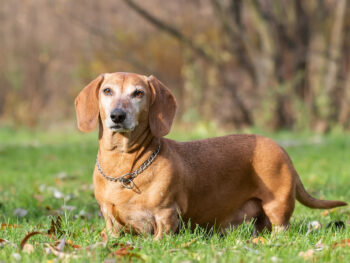


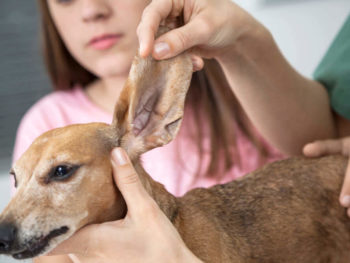


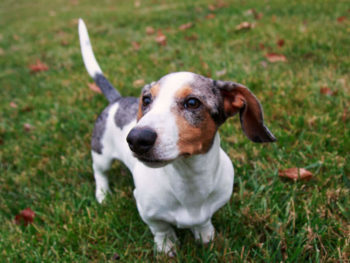
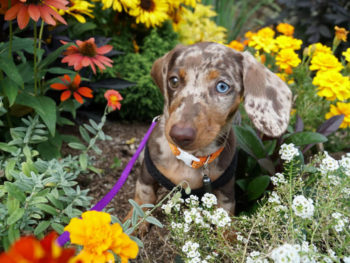
 Why Is My Female Dachshund Humping Things?
Why Is My Female Dachshund Humping Things?


